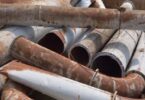PESHAWAR (APP): The increasing level of household pollution both in the shape of biomass and solid waste generation is posing serious threats to public health and the environment of the city. The air quality index in Peshawar in the current winter season has belled the alarm by recording a dangerous stage of more than 236 pollution levels; raising the status of the city to the most polluted in the country.
According to environmental experts, the major source of air pollution is vehicular emission followed by household pollution in shape of the burning of fossil fuel, wood and waste for cooking at home. A recent study by Peshawar Clean Air Alliance (PCAA), a volunteer association of civil society individuals, found that transport is contributing 58.46 percent in air pollution and is followed by household pollution making a contribution of 11.66 percent while waste burning 4.1 percent and dust 17.67 burning.
It showed that Khyber Pakhtunkhwa has one of the highest proportions of wood fuel usage, particularly in rural households and about half of Peshawar population lives in rural area. According to 2017 census, about 138000 households in Peshawar used wood as fuel for heating. The study titled `Status of Air Pollution in Peshawar’ finds that the annual Fine Particulate Matter (PM2.5) in Peshawar has ranged between 61.40 ug/m3 and 80.09 ug/mg3, exceeding the current national and provincial standards by 4 to 5 times and WHO air quality guidelines by 12-16 times.
High level of PM 2.5 have a considerable impacts on the population of Peshawar as the Air Quality Life Index (AQLI) estimates that citizen of Peshawar can add up to 2.3 years to their life expectancy if air quality level meets the WHO’s guidelines. “Peshawar has been declared as the third most polluted city in Pakistan and the 9th most polluted in the world in the 2021 World Air Quality report,” says Dr. Adil Zareef, a public health expert and convener of PCAA.
Talking to APP, Dr. Adil said while evaluating the current year data of Peshawar air quality, the city has jumped from third most polluted city in Pakistan to number one. In November and December 2023, sometimes the air quality index of Peshawar crossed the pollution level of Lahore, the most polluted city of Pakistan. He said according to Health Department Report, around 93,000 cases of pneumonia have been reported in Khyber Pakhtunkhwa in the current year, an indication of an increase in chest and respiratory problems mainly due to toxic air.
“It’s time for chalking out a multi-sectorial policy to air pollution and safe public from different health-related ailments connected with poor air quality,” Dr. Adil stressed. “Introduction of “Environmental Green Police” can be given a regulatory authority under Environment Protection Agency (EPA) KP to impose environmental penalties on the offenders as is practiced in many countries,” he suggested.
Green policing can also help in implementation by the regulatory authorities, as the visibly emitting vehicle should be considered a public crime and banned from plying on streets through strict administrative measures. “Improving air quality is a long-term effort and requires a shared vision that’s longer than the political cycle and a multi-sectoral approach,” opined Dr. Asif Khan, a consultant on Climate Change and Water for Asian Development Bank (ADB).
An interactive partnership among the civil society, academia, and public health experts and government can realize the vision for a healthy Peshawar, Asif added. “Apart from air pollution, accumulation of solid waste is also a big issue regarding household pollution,” observed Fawad Prizada, a young environment activist from Peshawar. Fawad has developed a mobile app for lifting garbage from homes and its proper disposal to keep the city’s environment clean.
Holding BS degree in Computer Science (CS), Fawad Pirzada, a city dweller, obtained training from the National Incubation Center (NIC) and developed the app to continue with his passion of protecting the environment and also make some earning through it. Titled as `The Kabari’ (Garbage collector), the app provides a facility to people at their doorstep for removal of garbage gathered in their homes causing a nuisance for inmates.
Fawad said the app is launched around two months earlier and is restricted to a specific area of Peshawar. He said Peshawar is generating around 1000 tonnes of solid waste on daily basis and proper disposal of such a huge quantity waste not only requires resources but also scientific approach. Fawad stressed spreading awareness about income generation from solid waste through its segregation. He said he is also earning from Kabari App and such initiatives needed to be taken by a large number of people in other parts of the city.
Fawad said the charges he made for scarp collection and for payment of used items is very reasonable and up to the satisfaction of customers. “The population of Peshawar is more than four million and at the same time, the city’s solid waste generation almost doubled in the last few years from 580 tonnes per day in 2014 to more than 1,000 tonnes,” shared Sajid Ali, an official of Water and Sanitation Services Peshawaar.
The Peshawar Cantonment Board, an independent municipality on military-controlled land, produces an additional 60 tonnes of waste on a daily basis. Under this growing burden, the city has struggled to find a suitable site to dump its waste. However, the scientific way of disposal of solid waste requires a lot of financial resources, he added.
Sajid also urged Peshawar dwellers to take part and cooperate with public sector entities in the resolution of these problems posing severe threats to public health. He said without the cooperation and support of people, WSSP alone cannot remove all the dirt and waste left by people. Citizens have to show responsibility regarding proper disposal of waste by avoiding litter and making their environment clean and green, he added.







